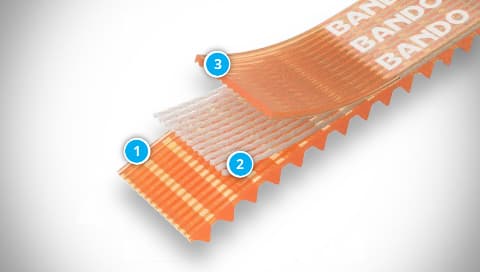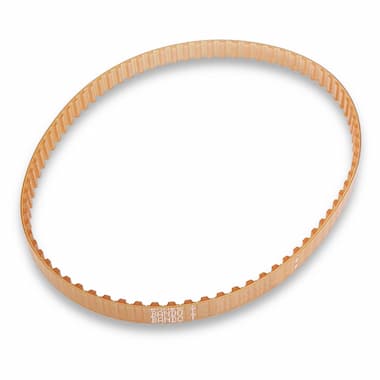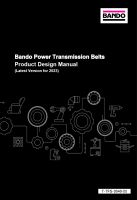2 TN10 - 160 BANCOLLAN (160 TN10-2.0 T)
Timing Belt
Belt Parameters
Pitch length of the belt. It is commonly denoted as Lp or Lp.
In the TYMA Product Catalogues you can find this material also described with the abbreviation PU+PES.
Belt Description
2 TN10 - 160 BANCOLLAN (160 TN10-2.0 T) is a timing belt designed for highly precise and stable transmission in low to medium power ranges, with high torque and at both low and high speeds. The triangular tooth profile ensures backlash-free contact between the belt and pulley, while the small pitch provides rotation smoothness similar to flat belts.
The belts are made from a special BANCOLLAN polyurethane compound reinforced with polyester tension member. They allow long-term, maintenance-free operation in miniature and very small transmissions, meeting demands for high transmission capacity, precision, and cleanliness.
Belt Construction

- Polyurethane teeth
- Polyester tension member
- Polyurethane backing
Belt Fields of Use
Bando BANCOLLAN polyurethane timing belts provide reliable solutions for very low, low, and medium power ranges across various applications.
They are typically used in machines and devices ranging from the smallest, miniature equipment such as printers, copiers, 3D printers, plotters, cameras, ATMs, optical devices, kitchen appliances, hand tools, industrial manipulators, and robots, among many others.
Their use is particularly advantageous in applications where oil from technological processes, transmissions, or bearings may affect belt properties (e.g., machining tools or gearboxes), in applications that generate ozone during operation (e.g., optical devices and copiers), or in applications requiring clean power transmission. The belts are suitable for laboratory and medical devices, as well as food processing and packaging machines.
Belt Characteristics
- Highly precise synchronous operation with minimal backlash
- Very high belt flexibility and durability
- Smooth rotation due to small pitch (close to the rotation of flat belts but with precise revolutions)
- High dimensional and shape stability
- Temperature resistance from −30 °C to +70 °C
- Maintenance-free
- Very clean operation (no small particles or dust released like with rubber belts)
- Resistance to oils, greases, acids, and alkalis
- Resistance to ozone
Documents for Download
Belt Manufacturer Profile
Japanese company Bando has been a pioneer in the non-tire rubber and plastics industries since their founding in 1906, responding to customer needs with new technology and product development.
Over the years Bando have expanded upon their core business to meet the ever-changing needs of the times, and they now produce a wide range of products. They now serve their customers worldwide from more than 10 countries in Asia, North America and Europe.







